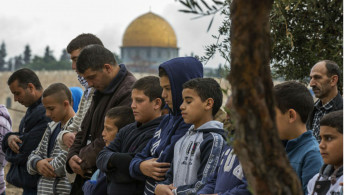Al-Aqsa reopens amid rising tensions in Jerusalem
The Al Aqsa mosque in Jerusalem was reopened on Friday morning in time for dawn prayers, after Israel severely restricted access in recent weeks and closed the facility entirely on Thursday.
The mosque continues to be off-limits to all but men over 50, women and young children, while Israel has deployed 3,000 police officers around the complex.
Israeli police killed a Palestinian man on Thursday morning who was suspected of shooting and wounding an ultranationalist Jewish activist, and the city was bracing itself for renewed tensions after Palestinian parties called for "day of rage" protests on Friday.
Arab countries and the US had called on Israel to reopen the mosque after Palestinian President Mahmoud Abbas said its closure was "a declaration of war".
Abbas' spokesman warned it would only fuel "more tension and instability", while Jordan's Islamic Affairs Minister Hayel Daoud said it was a case of "Israeli state terrorism".
Under its 1994 peace treaty with Israel, Jordan has responsibility for Muslim holy sites in Jerusalem.
Activist shot, Palestinian killed
The Haram al Sharif plaza, which houses al-Aqsa, is one of three holiest sites in Islam. Referred to as the Temple Mount by Israelis, it is also the site of the two ancient Jewish temples, the last of which was destroyed in Roman times. Non-Muslims are allowed to visit the site, except on Fridays, and while Jews are permitted to pray at the temple's Western Wall plaza, they have not been allowed to pray within the mosque compund.
Yehuda Glick, the American-born Israeli who was shot, was one of the most high-profile activists of Israel's messianic nationalist right wing who had long campaigned for the rights of Jews to pray in Haram al Sharif. He had been arrested several times trying to enter the mosque plaza - an act banned by both Israel's police and its Chief Rabbinate. The 48-year-old is said to be in a serious but stable condition with stomach, chest, neck and arm wounds.
The suspected gunman, Mutaz Hijazi, was killed when Israeli police stormed his house in the Abu Tor neighbourhood of occupied East Jerusalem.
Micky Rosenfeld, Israeli police spokesman, said that Hijazi was killed after "an exchange of fire", but his family told Al Jazeera English that the police ransacked his room, beat him, poured a water tank on him, then shot him on the rooftop of the family home.
Violent scenes have been a daily occurrence in occupied East Jerusalem since July when Palestinian teenager Mohammad Abu Khdeir was killed by Jewish settlers. Settler organisations have also been stirring tensions by taking over several buildings in the Silwan area near al-Aqsa in recent months.





 Follow the Middle East's top stories in English at The New Arab on Google News
Follow the Middle East's top stories in English at The New Arab on Google News
![Israeli forces ordered bombed Gaza's Jabalia, ordering residents to leave [Getty]](/sites/default/files/styles/image_330x185/public/2176418030.jpeg?h=a5f2f23a&itok=_YGZaP1z)

